27 Feb 2024 - {{hitsCtrl.values.hits}}

By Nuzla Rizkiya
Sri Lanka’s egg production could take a hit, due to the hot weather in the coming months, All Island Poultry Association (AIPA) President Ajith Gunasekara said.
“Production might decline at least by 10-15 percent, as production costs would increase for the local farmers, who will have to maintain stable humidity and temperature levels suitable for poultry in the farms,” he said.
Few poultry farms have already installed additional fans to tackle the heat, which have added to their costs, said Gunasekara.
According to the Central Bank data, the egg prices rose from Rs.53 to Rs.57 last month, in the local markets. The whole eggs in cartons are currently priced at Rs.67.
The daily requirement of eggs in the country is currently seven million and could reach up to over eight million during the festive seasons, Gunasekara said.
While Sri Lanka has the capacity to produce six million eggs per day, to bridge the gap, the government would likely resort to imports, to maintain the availability and affordability.
“These imported eggs will be distributed at Rs.43 each, through state-owned retailer Lanka Sathosa and via direct sales partnerships with the confectioneries and hotels across the nation,” he shared.
Gunasekara said that the association has raised concerns on the impact of imports on local poultry farms.
Last year, Agriculture and Plantation Industries Minister Mahinda Amaraweera told a press conference that there would be no chicken or egg imports to the country this year, highlighting Sri Lanka’s status as a bird flu-free country.
Meanwhile, despite the implementation of a special commodity levy on maize imports, poultry production remains relatively unaffected, according to the AIPA.
“Local farmers can manage local poultry productions utilising the 40 percent of domestically sourced maize (200,000MT), which is sufficient for another four months, before resorting to maize imports,” Gunasekara said.
30 Nov 2024 10 minute ago
30 Nov 2024 3 hours ago
30 Nov 2024 5 hours ago
30 Nov 2024 6 hours ago
29 Nov 2024 29 Nov 2024